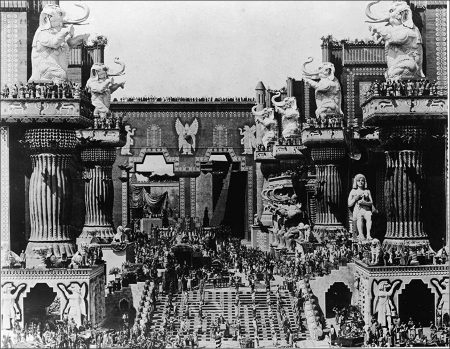Intolerance and its terrible effects are examined in four historical eras. In ancient Babylon, a mountain girl is caught up in the religious rivalry that leads to the city’s downfall. In Judea, the hypocritical Pharisees condemn Jesus Christ. In 1572 Paris, unaware of the impending St. Bartholomew’s Day Massacre, two young Huguenots prepare for marriage. Finally, in modern America, social reformers destroy the lives of a young woman and her beloved.
Director D.W. Griffith’s expensive, most ambitious silent film masterpiece Intolerance (1916) is one of the milestones and landmarks in cinematic history. Many reviewers and film historians consider it the greatest film of the silent era. The mammoth film was also subtitled: “A Sun-Play of the Ages” and “Love’s Struggle Throughout the Ages.” Griffith was inspired to make this film after watching the revolutionary Italian silent film epic Cabiria (1914) by director Giovanni Pastrone.
After the widespread controversy surrounding his racist masterpiece The Birth of a Nation (1915), Griffith attempted to defensively answer his critics with this work. He took a smaller feature film that he was working on about the contemporary, Progressive Era struggle between capital and labor [titled “The Mother and the Law”] and the theme of social injustice and combined it with three new stories to create a more spectacular, monumental, dramatic epic. All of the stories, spanning several hundreds of years and cultures, are held together by themes of intolerance, man’s inhumanity to man, hypocrisy, bigotry, religious hatred, persecution, discrimination and injustice achieved in all eras by entrenched political, social and religious systems.
Intolerance (1916)
Directed by: D.W. Griffith
Starring: Lillian Gish, Robert Harron, Mae Marsh, F.A. Turner, Sam De Grasse, Vera Lewis, Mary Alden, Eleanor Washington, Pearl Elmore, Lucille Browne, Julia Mackley, Miriam Cooper
Screenplay by: D.W. Griffith
Production Design by: D.W. Griffith
Cinematography by: G.W. Bitzer
Film Editing by: D.W. Griffith, James Smith, Rose Smith
Costume Design by: D.W. Griffith, Clare West
Art Direction by: Walter L. Hall
Music by: Joseph Carl Breil
Distributed by: Triangle Distributing Corporation
Release Date: September 5, 1916
Views: 242

